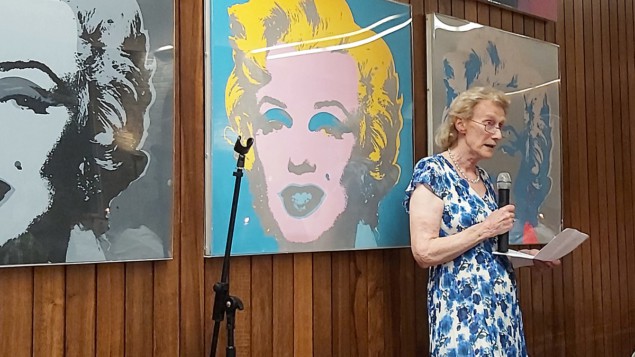
Over the years I’ve attended countless scientific conferences devoted to everything from astronomy to particle physics. As an editor, I’m usually the outsider at such events, looking dispassionately at the goings-on and reporting on whatever happens to pique my interest.
But earlier this week I went to a scientific meeting in which I was a protagonist myself. Held at the University of Cambridge, the event had been organized to mark the retirement of Dame Athene Donald, who was my own PhD supervisor at the Cavendish Laboratory many moons ago.
Entitled From Polymers to Biomoelcules, the meeting celebrated Athene’s extensive contributions to science, which have ranged from elucidating the physical properties of plastics to teasing out the microscopic structure of starch and other biological materials.
I had been invited by the meeting’s organizers – Ruth Cameron and Richard Jones – to take part in a panel debate with anthropologist Veronica Strang and biological physicist Mark Leake on the benefits and challenges of interdisciplinarity. It’s a theme that has been at the heart of much of Athene’s 50-year career in science, which has straddled physics, chemistry, materials and bioscience.
My PhD was interdisciplinary too, using techniques from physics to study the behaviour of biopolymers. In fact, I’d been attracted to the topic precisely because it involved thinking at the boundary of disciplines, where there are lots of open questions and many applications.
Trouble is, as I quickly learned, other physicists tended to look down their noses at Athene’s group, whose work (or so it felt) was dismissed as being trivial, unimportant and “not really physics”.
Although I hadn’t heard of the term at the time, I definitely had a sense of “impostor syndrome”: a nagging feeling I didn’t deserve to be there and wasn’t any good at my work either. Other people, it seemed, were better and doing more important science than me – and it would only be a matter of time before I was “found out”.
But as I discovered at this week’s conference, Athene admitted to suffering from impostor syndrome too. Yes, she had already established her physics credentials by the time I worked with her, but she was taking a massive risk as well by moving into uncharted, interdisciplinary waters. Being one of just a handful of women in what was then a highly male dominated department at the time didn’t help her confidence either.
Fortunately, Athene proved her doubters wrong and went on to have a glittering scientific career. In 1998 she became the first female professor of physics at the Cavendish. The following year she was made a fellow of the Royal Society and in 2009 won a L’Oreal/UNESCO award for women in science. For the past eight years she has been master of Churchill College, Cambridge – the first woman to hold that role since the college was founded in 1959.

Finding a way to belong: impostor syndrome and mental health
Another panel debate, featuring Julia Higgins, Beth Bromley and Helen Gleeson, focused on the challenges of making physics a more diverse and equitable discipline. There were also scientific talks about – or related to – Athene’s huge contributions to science. I particularly enjoyed Tony Ryan’s incredible account of how tomatoes are being grown inside refugee camps in Syria using foamy mattresses as a support structure.
But it was the notion of impostor syndrome that resonated most with me from the meeting. As Athene commented in her concluding remarks as the conference drew to a close: “This is the first time I’ve ever been at a conference where the main message is that ‘everyone suffers from impostor syndrome’.”
If even top physicists like her face the problem, the prevalence of impostor syndrome is obviously not down to individuals, but arises from faults in the wider academic system. Quite why that is the case will have to wait for another day.
